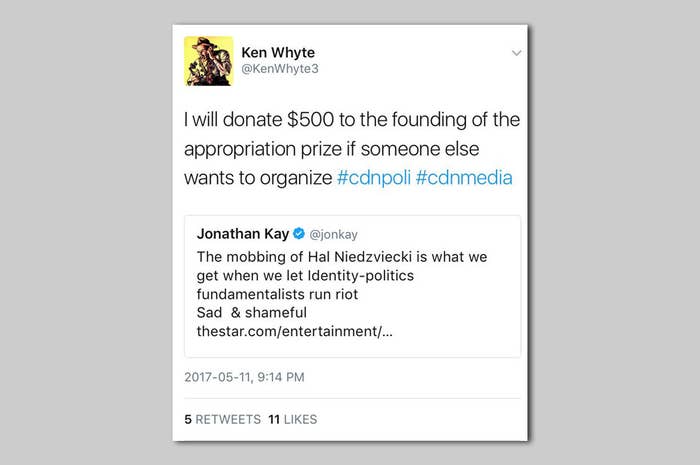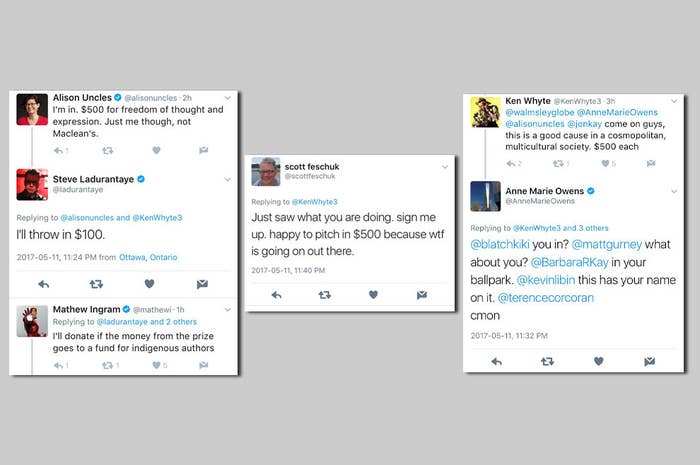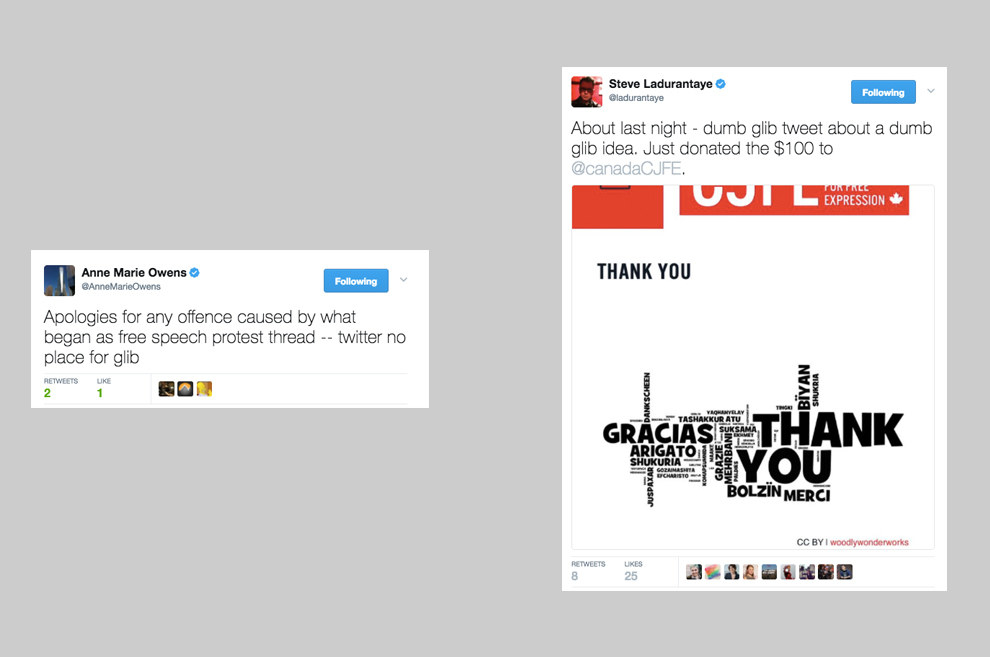
Working as a writer often feels like walking up to a very thick, resilient brick wall, shaking its hand and saying, “Hi, nice to meet you, I follow you on Twitter,” and then smashing your face into it over and over and over again until one brick from the wall gently tumbles out. You do this forever and then maybe one day you start teaching budding writers to do the same. I don’t know why any of us write; it is a terrible sickness.
So it’s always frustrating when someone else writes something that you know is either poorly written, or is based in some specious, ridiculous argument. This week, Hal Niedzviecki resigned as the editor of The Writers’ Union of Canada’s magazine after he wrote a piece called “Winning the Appropriation Prize.” He said he didn’t believe in cultural appropriation, that writers “should be encouraged to imagine other peoples, other cultures, other identities.” He encouraged readers to “win the Appropriation Prize.” This all in an issue that was dedicated to Indigenous writing — the editor undercut his own publication’s efforts to highlight Indigenous writers by mocking their very real concerns and contributions.
Naturally, a fraction of the already fragmented (and remarkably small) Canadian media landscape looked at the objections to his column and his subsequent resignation as PC culture gone wrong, or an example of how free speech is being eroded in Canada. (None of them, however, said as much when former Toronto Star columnist Desmond Cole left his position after being told by Star brass that he couldn’t be an op-ed writer and an activist.)
In response, at around midnight on Twitter, a group of white editors, executives, and longtime columnists for some of Canada’s largest mainstream publications started collecting money for an “Appropriation Prize” similar to what Niedzviecki suggested in his piece. Ken Whyte, formerly the president of Rogers Publishing, started it off with $500. Anne Marie Owens (editor in chief of the National Post), Alison Uncles (editor in chief of Maclean’s magazine), Steve Ladurantaye (managing editor of CBC News), Steve Maich (head of digital content and publishing for Rogers Media), Scott Feschuk (Maclean’s columnist), and Christie Blatchford (National Post columnist), amongst others, all volunteered to fork over hundreds of dollars for a prize that would reward people for culturally appropriating in their work. Walrus editor Jon Kay didn't offer money but retweeted Whyte's call and objected to Niedzviecki's resignation.
See? Free speech!

I can’t believe I have to fucking say this, but no one, in the history of writing books, has ever suggested that white people are not allowed to write thoughtful portrayals of Indigenous people or people of colour, namely in fiction. Frankly, we encourage it. But remember how fucking mad all of you got when you found out there’d be a black Stormtrooper in Star Wars? Remember when some of you got hot over the suggestion that Santa Claus, a literal figment of children’s imaginations, could be black?
Promoting the work of white writers who use another culture for profit isn’t trying. It’s meeting the laziest kind of diversity metric, one that doesn’t actually shift power balances or change the status quo. Abstaining from cultural appropriation wouldn’t stop you from writing thoughtfully about people who aren’t white. It does, however, stop you from ripping off people of colour, or pretending like you understand their stories intimately. It does preclude you from taking a culture that was never yours to begin with — a culture that might have made the lives of the people born with it harder in white Canada, or might mean they don’t get the same opportunities and privileges — and turning a profit.
Canada publishes a laughably low number of books by people of colour, namely black and Indigenous writers, and the discrepancy is just as bad in journalism. You don’t get to check off a box for diversity for allowing your white writers to invent the lives of POC people. That’s not enough. You have to actually find people who write and speak and live from different perspectives, and promote them. And pay them, because historically and currently, they’re not getting work, and they’re not getting money. White writers using their very histories and cultures, naturally, get their dues.
Did these prominent Canadian journalists and media executives think we wouldn’t see it? Twitter is public! It’s public!!!!
It was such a warped blessing to watch the conversations unfold, in real time, on a public platform. Writers are already insecure people — about their work, their connections, their personal interactions. Writers of colour are often told to chalk it up to paranoia. But we know this is how white editors sometimes talk about us, that we’re aggressive, or irrational, that we ask for too much or we’re SJWs trying to maintain PC cultures. (Mostly a lot of acronyms, I guess.) This Twitter thread, though possibly glib, told all of us that we were right the whole time: They do talk about us like this when we’re not listening. They don’t give a shit. They’ll ask about how to hire diverse voices all the time, they’ll jump on one of the very few black columnists in the country when he becomes available for freelance work, but when you’re not looking, they’ll put you last — and fall over themselves to fund a cultural appropriation prize. What do they say when we can’t see them?

The conversation was so nakedly cruel, with no shred of possible empathy for people who are really struggling to get their work read, recognized, and appreciated not only by an audience, but by these exact editors who act as gatekeepers to said audience. Even more egregious is that this whole argument was rooted in appropriation of Indigenous voices and stories, people who we’ve taken so much from already. Physical space, safety, bodies, culture — we can’t even let them tell their own stories in an issue of a magazine dedicated to their narratives without undercutting them first.
How are we supposed to write for you when you talk about us like this? Writing for an editor is already such a fraught process; it requires a lot of trust, emotionally and editorially, on both sides. Actively dismissing the concerns of people of colour — who you need for your businesses to survive — is foolish on so many levels, the least of which being that writers just won’t trust you with their work.
But most importantly, the starkest element of this was how ready they were to throw money around. Money that we’ve never seen get publicly tossed around to promote actual diversity in media. Money that they were giving up from their personal accounts; they were willing to publicly pledge $300 or $500 individually for a prize that celebrates whiteness.
It’s morning now, so some apologies have started to drip in, mostly saying sorry for “glibness,” retracting their offers. Poorly-timed jokes are glib. An eye-roll, that’s glib. Suggesting that you’d give real money from your pocket for an Appropriation Prize, that’s not glib. That just tells me you slipped. You forgot that we could see you, that now we have in writing how little our work matters, how our feelings don’t count at all. But good, I’m glad we know that it’s somehow easier for them to part with their money for a joke than it is to give it to the voices who need it most.
CORRECTION
Jon Kay, the editor of The Walrus, retweeted Ken Whyte's call and objected to Hal Niedzviecki's resignation. This post incorrectly said he pledged money to the prize.
